We may not have the course you’re looking for. If you enquire or give us a call on +91 8037244591 and speak to our training experts, we may still be able to help with your training requirements.
Training Outcomes Within Your Budget!
We ensure quality, budget-alignment, and timely delivery by our expert instructors.

Businesses employ strategies like Business Analysis (BA) to excel in the market. What is Business Analysis? It’s a discipline that helps companies outshine rivals by defining needs and creating value-driven solutions. It’s about questioning current operations and deciding if changes are necessary. This introspection is crucial for maintaining a competitive edge.
In this blog, you will learn "What is Business Analysis?" and its processes, methods, importance, and career opportunities.
Table of Contents
1) What is Business Analysis?
2) What is Business Process Analysis?
3) What is Business Impact Analysis
4) Examples of Business Analysis
5) Business Analytics vs Business Analysis
6) Business Analysis Techniques
7) Business Analysis Tools
8) Business Analysis in New Product Development
9) Business Analysis Challenges
10) Business Case Analysis
11) Career as a Business Analyst
12) Benefits of Business Analysis Certification
13) Conclusion
What is Business Analysis?
Business Analysis is the process of identifying a company's needs and completing tasks to ascertain those needs using specialised techniques. It also involves advocating adjustments and offering solutions that add value for the stakeholders. Several possible alternatives could involve software and digital data, but they could also involve organisational changes, including streamlining procedures, creating new policies, and conducting strategic planning.
Business Analysis can also be carried out to comprehend how an organisation is doing or to serve as a foundation for identifying business needs. Business Analysis is usually conducted to define and validate solutions that satisfy business demands, objectives, or goals.
This process provides concepts and insights into creating the primary business analysis framework for each project. It keeps the key to directing project stakeholders who carry out business modelling in a systematic way.
What is Business Process Analysis?
Business Process Analysis (BPA) is a systematic approach to scrutinise and improve an organisation’s workflow. It’s about pinpointing, recording, and dissecting existing processes to uncover and rectify inefficiencies.
Here’s a streamlined version of the BPA process:
a) Initiation: Recognise the need for analysis due to inefficiencies or customer feedback. Set the analysis’s scope and goals and choose which processes to examine.
b) Planning: Craft a comprehensive plan outlining the analysis’s methodology, tools, resources, timeline, and responsibilities.
c) Data collection: Accumulate relevant data, including process documents, performance metrics, historical records, and stakeholder input.
d) Process mapping: Visually chart the current process with flowcharts or diagrams to illustrate activity sequences, decision points, and interactions.
e) Data Analysis: Evaluate the data to spot patterns, trends, and problem areas using methods like root cause and Pareto analysis.
f) Identifying improvement opportunities: Identify process components needing changes or automation to boost efficiency.
g) Solution generation: Brainstorm potential fixes with cross-functional teams to devise innovative, practical solutions that meet organisational objectives.
h) Future state design: Integrate solutions into a revamped process to overcome current issues and leverage improvement opportunities.
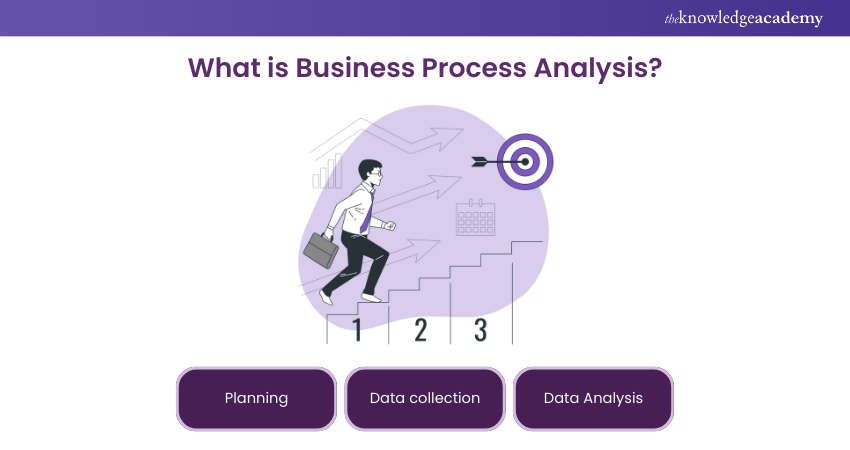
i) Implementation planning: Develop an execution plan detailing the necessary steps, resources, and timelines.
j) Testing and validation: Pilot changes on a small scale to fine-tune the process.
k) Implementation: Deploy the new process organisation-wide, ensuring stakeholders are informed and equipped to adapt.
i) Monitoring and evaluation: Track the new process with KPIs to evaluate the improvements against the original state.
m) Feedback collection: Gather input from employees, stakeholders, and customers to inform continuous adjustments.
n) Continuous Improvement: Keep the BPA cycle ongoing, adapting the process based on new feedback, data, and business needs.
o) Documentation and Communication: Maintain thorough records throughout the BPA cycle to document the analysis, changes, and outcomes, facilitating knowledge transfer and future reference.
Try our BCS Certificate in Requirements Engineering today!
What is Business Impact Analysis?
A Business Impact Analysis (BIA) is a strategic tool that forecasts the effects of business interruptions, providing essential data to formulate proactive recovery strategies. For instance, a manufacturing firm might conduct a BIA to evaluate the repercussions of losing a crucial supplier on its operations and profits.
A BIA determines the operational and financial ramifications of unforeseen events—such as server outages or market shifts due to a global crisis. Gathering data through a BIA equips you with the knowledge to anticipate and tackle these challenges effectively. Insights gained from a BIA can inform the development of a business continuity plan, detailing your team’s approach to managing sudden changes in the business environment analysis.
Examples of Business Analysis
Business Analysis is a versatile field encompassing various techniques and practices. Here are five Business Analysis Examples:
a) Strategic planning: A Business Analyst evaluates a company’s strategic direction and identifies initiatives to achieve business goals. For example, they might analyse market trends to guide the company’s product development strategy.
b) Requirements management: Analysts gather and manage stakeholder requirements for a new software system. They ensure the final product aligns with user needs and business objectives, often using tools like case models.
c) Process design: Business Analysts redesign an organisation’s workflow to improve efficiency. They might map out current processes and suggest improvements, such as automating manual tasks.
d) Data Analysis: Analysts use data to drive business decisions. For instance, they might analyse customer data to identify buying patterns and inform marketing strategies.
e) Change Management: When a company implements a new technology, Business Analysts help manage the transition. They plan and oversee the change process, ensuring minimal disruption and aligning new systems with business strategies.
These examples illustrate how Business Analysis can optimise operations, drive growth, and facilitate organisational change.
Business Analytics vs Business Analysis
Business Analysis (BA) and Business Analytics (BA) are distinct disciplines that play crucial roles in organisational success. BA focuses on understanding business needs, facilitating change, and ensuring solutions align with strategic goals. It involves strategic business planning, business model analysis, process design, and system analysis to create organisational value.
Conversely, Business Analytics uses statistical methods and technologies to analyse historical data and generate insights for strategic decision-making. It includes descriptive, predictive, and prescriptive analytics and decision automation, often employing AI algorithms.
Here’s the key differences between Business Analytics vs Business Analysis:
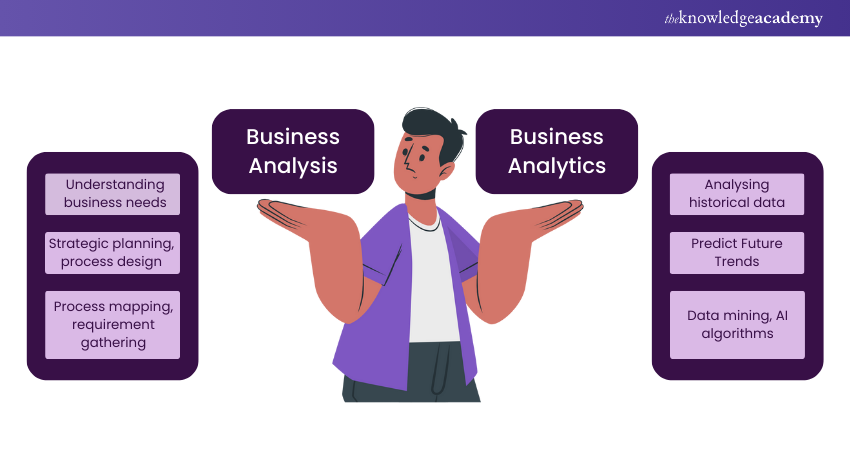
Business Analysis is akin to a bridge between stakeholders and technical teams, ensuring implemented solutions resolve issues and align with strategic objectives. Business Analytics, however, emphasises data exploration and pattern recognition to enable predictive modelling and data-driven decisions.
Interested in Business Analysis Training? Try our BCS International Diploma in Business Analysis!
Business Analysis Techniques
Business Analysis is pivotal in guiding organisations through change and improving processes. Here are five key techniques:
a) Business Process Modeling (BPM): This technique involves creating detailed flowcharts or diagrams to visualise and analyse the current processes within an organisation. It helps in identifying inefficiencies and areas for improvement.
b) Brainstorming: A collaborative method where team members generate ideas and solutions for business problems. It encourages open and creative thinking to explore all possible avenues for improvement.
c) CATWOE: This stands for Customers, Actors, Transformation process, Worldview, Owner, and Environmental constraints. It’s a technique that helps analysts understand what the business aims to achieve and the impact of various factors on its operations
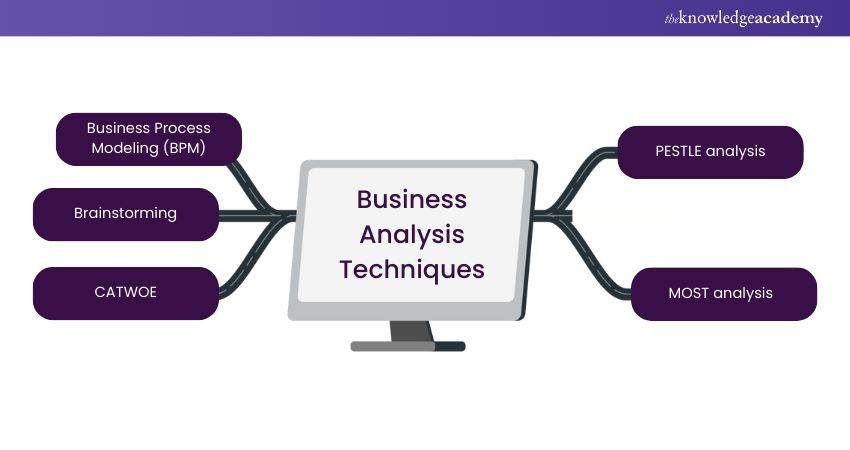
d) MOST analysis: This framework stands for Mission, Objectives, Strategies, and Tactics. It ensures that an organisation’s goals and strategies are aligned with its vision and mission.
e) PESTLE analysis: This technique examines the external factors affecting an organisation. PESTLE stands for Political, Economic, Social, Technological, Legal, and Environmental influences.
These Business Analysis Techniques offer a unique lens through which Business Analysts can scrutinise and improve organisational processes, ensuring they align with strategic goals and respond effectively to external and internal changes.
Want to know more about the Architecture techniques used in Business Analysis? Register for our BCS Foundation Certificate In Architecture Concepts And Domains Course now!
Business Analysis Tools
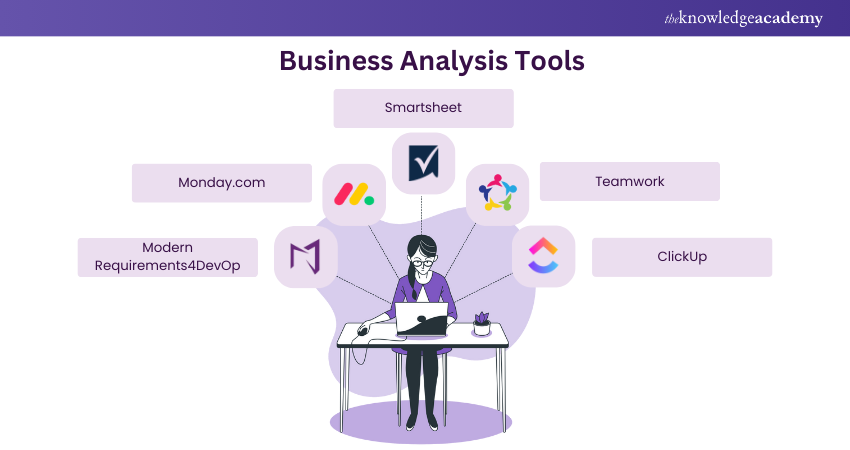
Business Analysis tools are essential for evaluating and improving organisational processes. Here are five prominent tools used by Business Analysts:
a) Modern Requirements for DevOps: This tool is designed for managing requirements effectively within the DevOps environment. It integrates with Azure DevOps to streamline the requirements gathering and analysis process.
b) Monday.com: A versatile platform that allows Business Analysts to track performance and manage projects and teams efficiently. It offers customisable workflows and collaborative features.
c) Smartsheet: A powerful project management tool, Smartsheet facilitates Business Process modelling and helps organise and automate tasks to enhance productivity.
d) Teamwork: This task management system is known for its user-friendly interface. Teamwork assists in planning, executing, and delivering projects, focusing on collaboration and resource management.
e) ClickUp: A single app to replace them all, ClickUp brings tasks, docs, goals, and chat into one place. It’s known for its adaptability to different work styles and comprehensive feature sets.
These Business Analysis Tools help Business Analysts in various ways, from Project Management to requirements documentation, offering a range of functionalities to suit different organisational behaviour.
Business Analysis in New Product Development
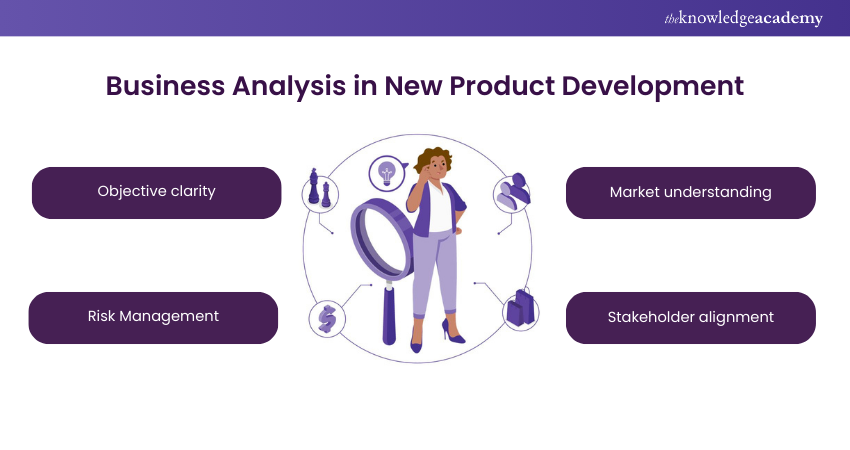
Business Analysis in new product development is essential for several reasons:
a) Market understanding: BA helps in comprehensively researching the market, understanding trends, and identifying customer needs, ensuring the product is well positioned for success.
b) Stakeholder alignment: It identifies all potential stakeholders, including customers, partners, and competitors, ensuring their interests are considered in the product development.
c) Objective clarity: BA clarifies the project goals and business objectives, providing a clear direction for product development strategies.
d) Risk Management: By analysing different options and their associated risks, BA aids in making informed decisions, thereby reducing potential pitfalls during product development.
e) Scope definition: It helps define the development goals and the project scope, which is crucial for resource allocation and project planning.
These reasons highlight the importance of BA in guiding product development towards market relevance, stakeholder satisfaction, strategic clarity, risk mitigation, and clear project boundaries.
Gain skills that can be implemented in real workplace situations. Register for our BCS Foundation Certificate in Organisational Behaviour today!
Business Analysis Challenges
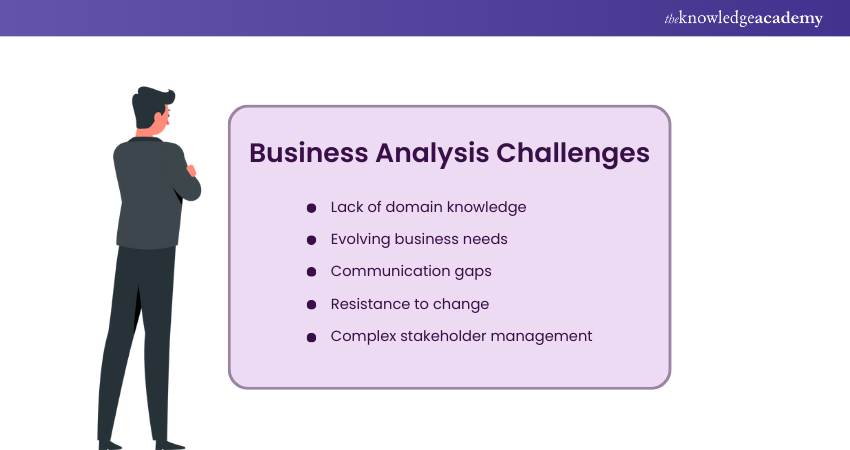
Business Analysis (BA) is a critical function in organisations but comes with challenges. Here are some common hurdles faced by Business Analysts:
a) Lack of domain knowledge: Analysts often work across various domains, and a lack of expertise in a specific area can hinder their understanding of business requirements.
b) Evolving business needs: Analysts must adapt quickly to evolving requirements and expectations as businesses grow and markets change.
c) Communication gaps: Effective communication is key in BA, but differences in language, culture, or technical understanding can create significant barriers.
d) Resistance to change: Stakeholders may resist changes proposed by analysts, especially if they alter established workflows or require new skill sets.
e) Complex stakeholder management: Balancing the conflicting interests of various stakeholders while aligning with business objectives is a delicate task.
These Business Analysis Challenges require analysts to be adaptable, communicative, and knowledgeable about the business and its broader context.
Business Case Analysis
Business Case Analysis (BCA) is a systematic approach used to evaluate and compare the potential outcomes of business decisions. It involves creating detailed business analysis report, known as business cases, outlining the costs, risks, and benefits of a particular decision. This process is crucial for project managers and decision-makers in large organisations, as it provides a structured way to assess the viability of projects and initiatives.
The core of BCA is to answer three fundamental questions: What are the costs? What are the risks? And what are the expected benefits? By addressing these questions, stakeholders can make informed decisions based on a comprehensive understanding of their choices' financial and non-financial impacts.
A typical BCA report will include:
a) A financial appraisal
b) A strategic proposal
c) A marketing plan
d) An analysis of how the project aligns with the organisation’s larger business objectives
It’s a critical document that justifies project expenditures by demonstrating how the benefits of a project outweigh its costs.
Careers as a Business Analyst
Business Analysis is a dynamic field that offers a variety of career paths. Professionals in this area work to bridge the gap between IT and the business using data analytics to assess processes, determine requirements, and deliver data-driven recommendations and reports to executives and stakeholders.
Business Analyst roles and responsibilities
Business Analysts are responsible for understanding business needs and assessing the impact of changes. They analyse and document requirements, develop business cases, and act as the key liaison between stakeholders. Here are some of the Roles and Responsibilities of a Business Analyst:
a) Identifying areas for improvement within Business Processes.
b) Researching and implementing new systems or modifications.
c) Present findings and collaborate with teams to execute solutions.
d) Ensuring that solutions meet business needs and requirements.
These are some common Roles and responsibilities that you may find in the Business Analyst Job Description
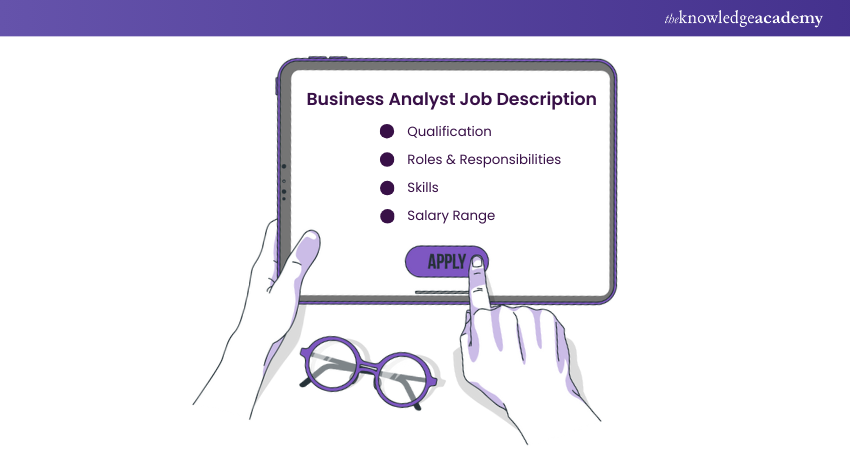
Skills required to be a Business Analyst
A successful Business Analyst typically possesses a mix of technical and soft skills. Here are some Business Analyst Skills:
a) Analytical skills for effective problem-solving
b) Communication skills to articulate findings and rally support
c) Technical proficiency in Data Analysis tools like SQL and Excel
d) Project Management skills to oversee project progress
Qualifications required to be a Business Analyst
Here are the various requirements to fulfil the list of Qualifications for the role of a Business Analyst:
a) A bachelor’s degree in business or a related field.
b) Relevant work experience in business or IT.
c) Optional but beneficial certifications like the Entry Certificate in Business Analysis (ECBA).
Interested in Business Analysis Training? Try our BCS Foundation Certificate in Business Analysis!
Business Analyst Salary
Business Analysts play a crucial role in various sectors, analysing and improving Business Processes and systems. They may start with a graduate salary ranging from £21,000 to £31,000, with experienced Analysts earning up to £80,000 or more, especially in finance. The role may involve working on specific projects or as a permanent feature of an organisation, requiring a deep understanding of the business and its sector.
Here’s the average Salaries for Business Analysts in different countries

Source: Glassdoor
Unlock your potential with the most up-to-date Business Analyst Interview Questions and Answers and land your dream job!
Benefits of Business Analysis Certification
Business Analysis Certifications are highly beneficial for professionals looking to enhance their careers. Here’s an expanded explanation of the advantages:
a) Professional recognition: Certifications in Business Analysis are recognised internationally and can significantly boost your professional profile. They testify to your knowledge and expertise, making you stand out in the job market.
b) Increased job opportunities: Many organisations prefer or require certified Business Analysts. Certification can open doors to new job opportunities and make you eligible for roles that might otherwise be out of reach.
c) Validation of skills: Certifications objectively measure your skills and knowledge. They confirm that you have met a certain standard of competence, which can reassure employers of your capabilities.
d) Higher salary potential: Certified Business Analysts often command higher salaries than their non-certified counterparts. The certification marks excellence that can justify a higher pay grade

e) Networking opportunities: Being certified can connect you with a community of professionals, offering networking opportunities that can lead to career growth and development.
f) Commitment to the field: Earning a certification shows that you are committed to your career in Business Analysis. It reflects a dedication to professional growth and a desire to stay current in the field.
g) Better project outcomes: Certified Business Analysts are equipped with best practices and methodologies that can lead to more successful project outcomes and greater efficiency in business operations.
h) Personal satisfaction: Achieving a certification can be personally gratifying. It’s a milestone that can provide a sense of accomplishment and confidence in your professional abilities.
Conclusion
Hope you now have a clear idea about "What is Business Analysis?" by reading our comprehensive blog. Implementing Business Analysis techniques can help you stand out as a candidate for positions across various businesses and industries. Companies that will recognise and take advantage of new opportunities in the fast-evolving business climate of today may succeed more than those remaining neutral.
Check out our BCS Foundation Certificate in Business Change if you wish to become a Certified Business Analysis Professional.
Frequently Asked Questions

The core of Business Analysis lies in understanding and managing changes, identifying needs, devising solutions, understanding context, engaging stakeholders, and delivering value. These six core concepts interrelate to form a dynamic framework for effective Business Analysis.

BRD stands for Business Requirements Document. It’s a formal document that outlines the business objectives, needs, and expectations for a project. The BRD guides stakeholders in making decisions about project priorities, design, and structure, ensuring alignment with business goals.

The Knowledge Academy takes global learning to new heights, offering over 30,000 online courses across 490+ locations in 220 countries. This expansive reach ensures accessibility and convenience for learners worldwide.
Alongside our diverse Online Course Catalogue, encompassing 17 major categories, we go the extra mile by providing a plethora of free educational Online Resources like News updates, Blogs, videos, webinars, and interview questions. Tailoring learning experiences further, professionals can maximise value with customisable Course Bundles of TKA.

The Knowledge Academy’s Knowledge Pass, a prepaid voucher, adds another layer of flexibility, allowing course bookings over a 12-month period. Join us on a journey where education knows no bounds.

Dive into our Business Analysis Blogs, a trove of resources covering Business Analysis topics. Whether you are a beginner or aiming to enhance your Business Analysis skills, The Knowledge Academy's diverse courses and insightful blogs are your go-to source.
Upcoming Business Analysis Resources Batches & Dates
Date
 BCS Certificate in Business Analysis Practice
BCS Certificate in Business Analysis Practice
Mon 29th Apr 2024
Sat 4th May 2024
Mon 13th May 2024
Tue 28th May 2024
Mon 10th Jun 2024
Mon 24th Jun 2024
Mon 8th Jul 2024
Sat 20th Jul 2024
Mon 22nd Jul 2024
Mon 5th Aug 2024
Mon 19th Aug 2024
Mon 2nd Sep 2024
Mon 16th Sep 2024
Mon 30th Sep 2024
Mon 14th Oct 2024
Mon 28th Oct 2024
Sat 2nd Nov 2024
Mon 11th Nov 2024
Mon 25th Nov 2024
Mon 9th Dec 2024









 Top Rated Course
Top Rated Course





 If you wish to make any changes to your course, please
If you wish to make any changes to your course, please


